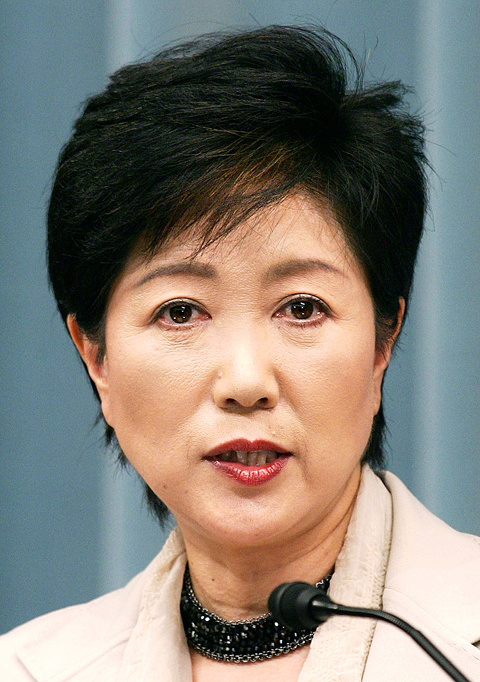Japan for the first time has a chance of a female prime minister in Yuriko Koike, but feminists are skeptical on whether she would do the country’s women any good.
Koike has hinted she may run in the Sept. 22 race within the ruling Liberal Democratic Party (LDP) to replace unpopular Prime Minister Yasuo Fukuda, who abruptly resigned last Monday.
The former TV anchorwoman would be the first woman to seek the prime minister’s post in male-dominated Japan, which has some of the world’s lowest rates of female representation in politics and business.

PHOTO: AFP
“I welcome a female candidate running in the election — generally speaking,” said Mitsuko Shimomura, a journalist and one of the founders of Win Win, a lobby for female politicians similar to the US Emily’s List.
“But her bid to become the first woman prime minister would do nothing to increase the social standing of Japanese women,” she said. “Many women around me feel sick to their back teeth.”
“As a politician, Ms Koike has never been enthusiastic about improving women’s social status as that agenda turns off men,” she said.
Koike, 56, who speaks fluent English and Arabic, made her name as an environment minister and an expert on foreign policy, rarely stressing her gender.
In an oblique reference during her brief tenure as defense minister last year, Koike likened herself to US Secretary of State Condoleezza Rice and told a US audience to call her “Madam Sushi” — a joke that fell flat back home.
Koike entered politics in 1992 and has faced criticism for cozying up to those in power at the time.
She was initially a protegee of Ichiro Ozawa, then an LDP heavyweight and now chief of a resurgent opposition — which hopes to defeat the long-dominant but now ailing ruling party in approaching general elections.
After a turbulent political decade, Koike entered the LDP in 2002.
Her latest political patron was reformist prime minister Junichiro Koizumi, who was popular during his 2001-2006 tenure. Koike now belongs to the largest faction in the LDP, along with Koizumi and many other party heavyweights.
Koike’s shrewdness was illustrated in the 2005 general election when she volunteered to switch her constituency and ran as an “assassin” candidate against an LDP member.
Kanako Otsuji, an opposition member who made an unsuccessful bid last year to be Japan’s first openly lesbian member of parliament, welcomed Koike’s bid as a move to break Japan’s glass ceiling.
“What’s important is that people physically see a woman stand as prime minister in parliament and answer questions from the opposition,” Otsuji said. “It’s a different story on whether she would uphold policies that are good for women.”
Also See: Japan’s rapid succession of prime ministers belies its global role

Auschwitz survivor Eva Schloss, the stepsister of teenage diarist Anne Frank and a tireless educator about the horrors of the Holocaust, has died. She was 96. The Anne Frank Trust UK, of which Schloss was honorary president, said she died on Saturday in London, where she lived. Britain’s King Charles III said he was “privileged and proud” to have known Schloss, who cofounded the charitable trust to help young people challenge prejudice. “The horrors that she endured as a young woman are impossible to comprehend and yet she devoted the rest of her life to overcoming hatred and prejudice, promoting kindness, courage, understanding

‘DISRESPECTFUL’: Katie Miller, the wife of Trump’s most influential adviser, drew ire by posting an image of Greenland in the colors of the US flag, captioning it ‘SOON’ US President Donald Trump on Sunday doubled down on his claim that Greenland should become part of the US, despite calls by the Danish prime minister to stop “threatening” the territory. Washington’s military intervention in Venezuela has reignited fears for Greenland, which Trump has repeatedly said he wants to annex, given its strategic location in the arctic. While aboard Air Force One en route to Washington, Trump reiterated the goal. “We need Greenland from the standpoint of national security, and Denmark is not going to be able to do it,” he said in response to a reporter’s question. “We’ll worry about Greenland in

PERILOUS JOURNEY: Over just a matter of days last month, about 1,600 Afghans who were at risk of perishing due to the cold weather were rescued in the mountains Habibullah set off from his home in western Afghanistan determined to find work in Iran, only for the 15-year-old to freeze to death while walking across the mountainous frontier. “He was forced to go, to bring food for the family,” his mother, Mah Jan, said at her mud home in Ghunjan village. “We have no food to eat, we have no clothes to wear. The house in which I live has no electricity, no water. I have no proper window, nothing to burn for heating,” she added, clutching a photograph of her son. Habibullah was one of at least 18 migrants who died

Russia early yesterday bombarded Ukraine, killing two people in the Kyiv region, authorities said on the eve of a diplomatic summit in France. A nationwide siren was issued just after midnight, while Ukraine’s military said air defenses were operating in several places. In the capital, a private medical facility caught fire as a result of the Russian strikes, killing one person and wounding three others, the State Emergency Service of Kyiv said. It released images of rescuers removing people on stretchers from a gutted building. Another pre-dawn attack on the neighboring city of Fastiv killed one man in his 70s, Kyiv Governor Mykola